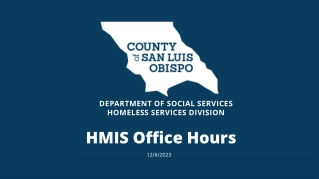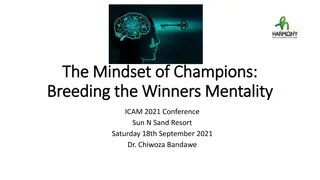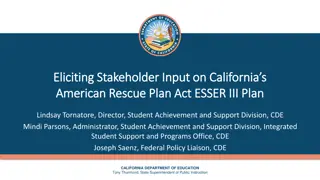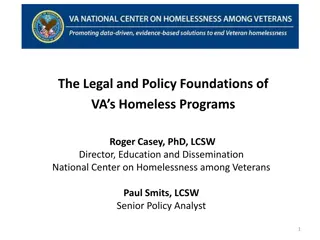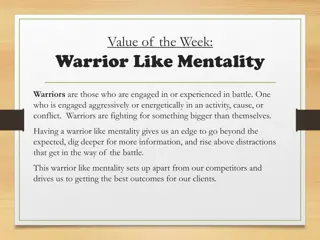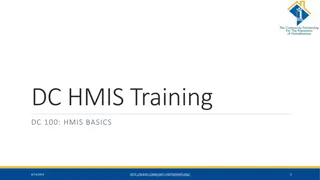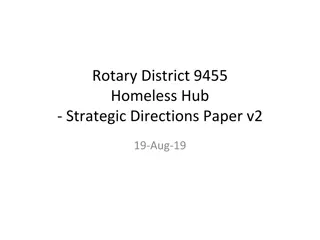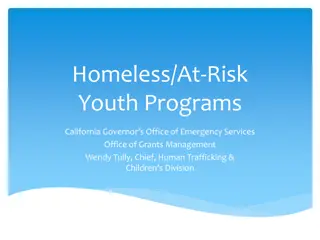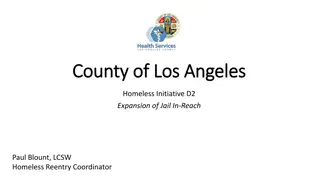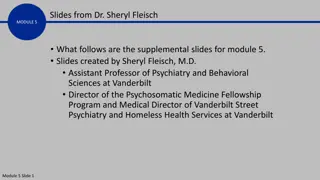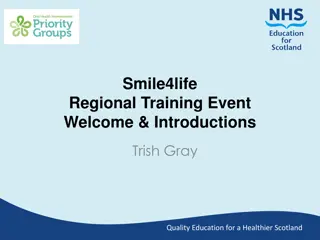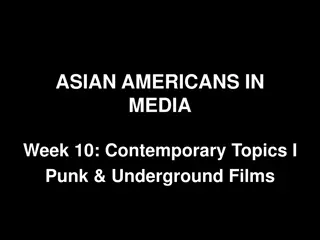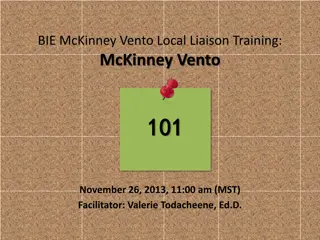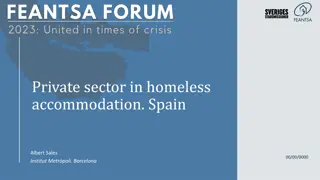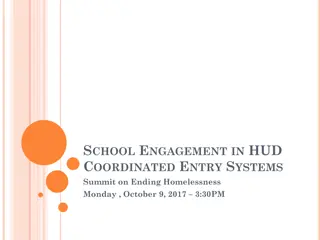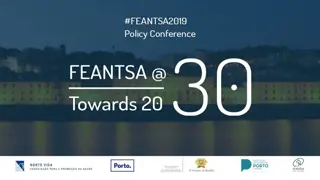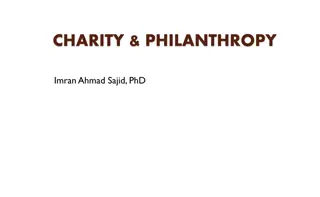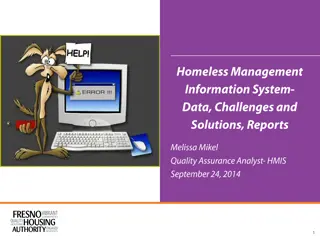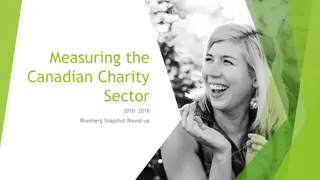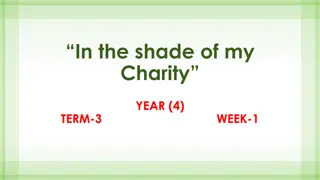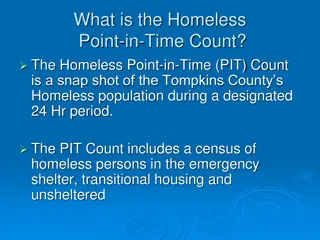Unconditional Respect in Homeless Services - Breaking the Charity Mentality
Julie Montgomery, Bary Hanson, and Meg Martin presented strategies for promoting unconditional respect in homeless services to combat the charity mentality. They emphasized collaboration, partnership, and innovative programs to address homelessness in Thurston County. Insights from Washington State Department of Commerce and Catholic Community Services shed light on the challenges faced and the transition to a Housing First approach in providing shelter and support to homeless individuals.
Download Presentation

Please find below an Image/Link to download the presentation.
The content on the website is provided AS IS for your information and personal use only. It may not be sold, licensed, or shared on other websites without obtaining consent from the author. Download presentation by click this link. If you encounter any issues during the download, it is possible that the publisher has removed the file from their server.
E N D
Presentation Transcript
Breaking the Charity Mentality: Unconditional Respect in Homeless Services Presented by Julie Montgomery, Washington State Department of Commerce Bary Hanson, Catholic Community Services SW Shelter and Housing Meg Martin, Interfaith Works Emergency Overnight Shelter
Who We Are COLLABORATION & PARTNERSHIP
Julie Montgomery Washington State Department of Commerce Consolidated Homeless Grant (CHG)/Homeless Management Information System (HMIS) CHG Program Manager: 8 counties/9 contracts Direct services work CONSOLIDATED HOMELESS GRANT A slice of the funding pie CHG/TANF/HEN Program management +
Bary Hanson Catholic Community Services Division Director Southwest Region Shelter & Housing Rural & Urban Housing Portfolio 8 separate programs in 4 counties (Pierce, Thurston, Kitsap, & Grays Harbor) DREXEL HOUSE Serves individual homeless adults (102 total) 50 Permanent Supportive Housing Units (Veterans) - 2017 36 Permanent Supportive Housing Units - 2007 16 Shelter Beds - 2007 Transition to HOUSING FIRST in 2014
Meg Martin, CPC, MSW Interfaith Works Emergency Overnight Shelter Director of IW Emergency Overnight Shelter and Warming Center Programs Designed Navigation Team Pilot Project Coordinated partnerships with Amahoro House and Olympia Free Clinic Working towards partnership with Providence and many local agencies to open Community Care Center, fall 2017. IW EOS & WARMING CENTER Shelter serves 42 individual single adults/couples and their pets/night. Warming Center served an average of 193/day Navigation Team participatory advocacy $33/night average for shelter with bolstered staffing/supervision $5/Per day average for warming center shooting for increased budget in 17
Our Community THURSTON COUNTY
Our Community: Thurston County Stats Mid-sized county. Population 272,690 (April 2016), about 2% growth from 2015 3,066 individuals were entered into homeless housing services 10/1/15 9/30/16 32% of those who were served were unsheltered upon entry
Our Community: Thurston County Influences on Homeless Services Olympia, Lacey, Tumwater, Yelm, Tenino, Rainier, Bucoda Mix of upcoming URBAN issues mixed with NIMBY & small town attitudes Perception of increased homelessness in downtown Olympia City legislation closes public spaces and bathroom issues around town Real economic issues/very fast growth for every $100 rent increase/39% increase in homelessness in non-metropolitan cities (Journal of Urban Affairs) Deserving populations vs Vulnerability Based Priorities Pressure on service providers unfunded mandates HOME Fund upcoming, CCC upcoming Trying to come up with creative solutions
What is the CHARITY MENTALITY? AND HOW DO WE BREAK IT?
Charity Mentality Charity is about power and who holds it Charity is seeing the poor as helpless victims Introspection Needed Why do you have the power you have? Who gave it to you, and how should you use it? Charity vs. Justice Charity is a matter of personal attributes Justice is a matter of public policy and human rights
Charity Mentality The image of charity Sums up the spirit of charity Charity rests on the foundations of guilt, privilege The belief that the poor will always be with us Charity is pity for those you are helping A needs based approach with those who HAVE giving to those who HAVE NOT
Charity Mentality NEEDS-BASED (focus on individual) Want to help people survive and develop to their full potential No moral or legal obligation on government to protect and assist Clients are seen as objects of charity Does not always take structural issues of oppression into account RIGHTS-BASED (focus on society) Want to help people survive and develop to their full potential Includes legal and moral responsibility and accountability Clients are encouraged and empowered to claim their rights Always tries to incorporate the realities of structural oppression into program design
Break the Mentality!!! Why the charity/needs based models of services won t end homelessness Treating the symptoms (the individual), not the sickness (society) Tools of the Trade Harm Reduction Naloxone administration requirement/policy, drug user statement Applicable WACs (Washington Administrative Code) or RCW (Revised Code Of Washington) Washington State law RCW69.50.315 (also known as the 911 Good Samaritan Overdose Law) allows a person acting in good faith to receive a naloxone prescription, possess naloxone, and administer naloxone to an individual suffering from an apparent opiate-related overdose. RCW69.50.315 prevents prosecution for drug possession for people who have an overdose or who seek medical help for someone else having an overdose. HB1671 is now active law in WA State. This law seeks to scale-up access to naloxone by making naloxone distribution to laypersons more efficient. The law specifically permits naloxone to be prescribed directly to an "entity" such as a police department, homeless shelter or social service agency. **While we can t have drugs/drug use on the property, we want to create an environment where people can talk openly about their use. If you have used and are at risk of overdose or worried about your safety, please tell us! We are here to help and want you to be as safe as possible. Being open and honest with us will not jeopardize your stay here. Principles apply not only to active drug use but mental health, conflict mediation, hygiene and general physical health issues. A commitment, a way of life, an active, ongoing process of unlearning in many cases.
Break the Mentality!!! Housing First How low-barrier are you? How much lower can you go? Do you screen people in or out? Who is not allowed to stay with you and why? Are you actively working against your mission by barring people from housing and shelter programs? Unconditional Respect Interfaith Works Emergency Overnight Shelter believes that our guests, regardless of their circumstance, condition or ability, are worthy of and deserve to feel respected, esteemed, and honored. The burden of respect is ours and is not dependent on the respect of our guests. We will hold our guests accountable for their choices and actions, but we do so in a manner that respects their rights as individuals and their worth as human beings. From IW EOS Operations Manual, Core Values Section Collective responsibility and accountability We must care for our elders, our young and everyone in between. People can t have a chance to succeed (regardless of their behavior/choices) if they die without access to care. Hire people with lived experience How do your hiring practices reflect the demographics and life experience of people you are serving? Pre Interview questions, inviting staff/guests (work in progress) into interviews
Break the Mentality!!! Housing is a human right. How does that basic value inform our work? Do your policies reflect your values as a program/org?
What does COLLECTIVE RESPONSIBILITY look like? WHAT EACH PARTNER BRINGS TO THE TABLE
GOVERNMENT: Responsibility for ending homelessness Politics of homeless services State guidance/local control The State Homeless Housing Strategic Plan - 2017 new statewide vision that directs our efforts and resources to ensure that people have a safe place to live. we need to ensure people most at risk of dying from violence or exposure to the outdoor elements receive assistance as rapidly as possible. Homelessness is solvable
HOUSING: True to the Mission We Believe... ...in every child growing up in a safe, loving and nurturing environment. in elders living in security and dignity. ...in healthy family life being affirmed and supported in our communities. Who are we serving? How are they being referred? ...in every person having the right to a safe, affordable place to call home. What services are in place? ...in compassion, love and respect for all people, especially those who are poor and vulnerable. Comb through all policies and procedures ...in joining with others to change the systems which oppress, discriminate or otherwise cause human suffering. Drug testing, sobriety requirements, criminal history Eviction procedures, liability insurance, maintenance $ ...in employees and volunteers working in an environment which offers respect, teamwork and excellence. Who wore it best? Who out there is killing it? Who is the best of the best? ...in all these things for all people, whatever their color, whatever language they speak or however they worship Being honest about where you stand and who you are
SHELTER: Come so far, so far to go Mission: To advance the social inclusion and empowerment of our neighbors experiencing homelessness through innovative practices of sheltering, mental health and emergency basic needs coordination. Focus on our guests Philosophy: Interfaith Works Emergency Overnight Shelter is dedicated to providing emergency services and support to those in need, not as charity but as an act of social justice. Homelessness, domestic violence, substance abuse, mental illness, and chronic physical health problems have left many in our community vulnerable and unsafe. The stigma associated with homelessness and poverty pushes those most in need further away, and refuses these individuals their basic human rights and dignity. The work of Interfaith Works Emergency Overnight Shelter is rooted in empowerment, social inclusion, and community education to end the unnecessary stigmatization of the most vulnerable. Couples can stay together, LGBTQQIA+ acceptance prioritized, responding to racism/POC experience prioritized, pets allowed, sobriety not required, ID not required, program participation not required, personal belongings OK. Target pop: Over 60, living with mental health, substance use, chronic health, permanent disability, high interaction with emergency services and experiencing chronic homelessness. Encourage participation and pride in belonging to the shelter community. Mental flexibility Values: Dignity, Respect, Care, Compassion, Competence, Integrity. Lead with Yes rather than No you can always do something to meet someone s needs. Organizational Principles: Basic Belief In People, Services to Our Guests, Commitment To A Healthy Staff Team, Professionalism, Commitment to Rapport, Commitment to Community Involvement, Community Building and Social Inclusion, Harm Reduction and Trauma Informed Care. Are the systems in place working? How do you evaluate and revisit systems? How do you get guest input about the way things run day to day? How often do you ask guests these types of questions? Can you change the rules? Can you survey your guests about how things are going? Can you turn to them for answers about the real impacts your decisions will have on their lives as residents at the shelter?
What does UNCONDITIONAL RESPECT look like? WHAT EACH PARTNER BRINGS TO THE TABLE
GOVERNMENT: Rights-based approach to policies and procedures Consolidated Homeless Grant Guidelines Waive Income Eligibility for households experiencing homelessness Coordinated Entry and Unsheltered Prioritization Flexible Funding Coming (very) soon: Low barrier option (July 2018) Minimize documentation required at CE Services must be voluntary
HOUSING: Lower barriers to meet you where you re at Lease violations and behavior based conversations HOUSING FIRST Weathering the storm; we can disagree Outlasting indifference, misunderstanding, and apathy Everything we can do, we will HARM REDUCTION Sobriety, safe use, supportive services, and a deep breath No pre-requisites for respect and communication Advocacy regardless TRAUMA INFORMED CARE Give up your power as a provider, you can t control the outcome Past trauma and continuing drama
SHELTER: The burden of respect is ours and not based on the respect of our guests. Focus on staff support as much as possible (there is so much we DON T have control over) and always know that it will never be enough that means support you and others in management too! Self preservation and resiliency focus Salary/Hourly pay always working towards a industry average/living wage (we are fighting poverty, right??) Benefits package after 3 months for all front line staff including fill-in Robust fill-in system, encourage staff taking space and time off Supervision: Three group staff meetings per month, two one on one supervision meetings per month with management. Fostering (and paying for) involvement from staff and encouraging transparency around decision making. i.e. POC caucus
SHELTER: The burden of respect is ours and not based on the respect of our guests. Focus on staff support as much as possible (there is so much we DON T have control over) and always know that it will never be enough that means support you and others in management too! Self preservation and resiliency focus Salary/Hourly pay always working towards a industry average/living wage (we are fighting poverty, right??) Benefits package after 3 months for all front line staff including fill-in Robust fill-in system, encourage staff taking space and time off Supervision: Three group staff meetings per month, two one on one supervision meetings per month with management. Fostering (and paying for) involvement from staff and encouraging transparency around decision making. i.e. POC caucus
SHELTER: The burden of respect is ours and not based on the respect of our guests. Mental flexibility Accommodation as a smart staff retention plan which serves you in the end Listen to the feedback you receive about how things can be better (do your best not to explain away why it can t happen even if it really can t happen focus on what you can do to respond to the concern) Are the systems in place working? How do you evaluate and revisit systems? How do you get staff input about the way things run day to day? How often do you ask staff these types of questions? Can you change the shift hours? Can you survey your staff about how things are going? Can you turn to them for answers about the real impacts your decisions will have on front line staff? How to share expectations of what respect/violent language means, build communication skills, conflict mediation skills and sense of belonging within the guest population to increase likelihood of mutual respect. What message are we sending and how can we hold people accountable for their actions if they don t have access to the information? ? As individuals, as a staff team, as a city, etc.
Mental flexibility Accommodation as a smart staff retention plan which serves you in the end Listen to the feedback you receive about how things can be better (do your best not to explain away why it can t happen even if it really can t happen focus on what you can do to respond to the concern) Are the systems in place working? How do you evaluate and revisit systems? How do you get staff input about the way things run day to day? How often do you ask staff these types of questions? Can you change the shift hours? Can you survey your staff about how things are going? Can you turn to them for answers about the real impacts your decisions will have on front line staff? How to share expectations of what respect/violent language means, build communication skills, conflict mediation skills and sense of belonging within the guest population to increase likelihood of mutual respect. What message are we sending and how can we hold people accountable for their actions if they don t have access to the information? ? As individuals, as a staff team, as a city, etc.
Even when YOU REPEATEDLY CALL 911 IN A NON-EMERGENCY
Even when YOU PUNCH A STAFF MEMBER
Even when YOU HAVE BODY LICE JUMPING FROM YOUR BEARD
Even when YOU CAN T PAY RENT ON TIME OR AT ALL
Even when YOU BRING IN A SQUIRREL AS YOUR SERVICE ANIMAL
Even when YOU VE BEEN DETAINED 14 TIMES IN 3 YEARS
Even when YOU ARE SCREAMED AT, INSULTED AND THREATENED AS A STAFF
Even when YOU ARE CAUGHT SMOKING METH (or whatever) IN THE BATHROOM (or wherever)
Even when YOU ARE IN THE THROES OF DEMENTIA OR PSYCHOSIS OR
Even when YOU TRY TO BURN THE BUILDING DOWN
Questions? EXPLETIVES ALLOWED
What is one tool you can take with you today? How soon can you implement it?
What is one bias / judgement / assumption you can leave behind? How will you encourage others at your agency to do the same?
Julie Montgomery Julie.montgomery@ commerce.wa.gov (360) 725-2963 Bary Hanson baryh@ccsww.org (360) 584 - 3867 Meg Martin meg@iwshelter.org (360) 951-6767 REFERENCES: - https://lindaraftree.com/2010/10/27/enough-of-the-charity-mentality/ - www.commerce.gov - Our own fucked up experiences


